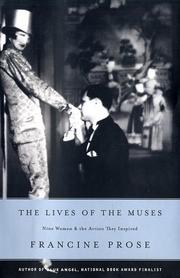| Listing 1 - 10 of 14 | << page >> |
Sort by
|

ISBN: 9684962436 Year: 1993 Publisher: México, D.F. Centro de Investigaciones y Estudios Superiores en Antropología Social
Abstract | Keywords | Export | Availability | Bookmark
 Loading...
Loading...Choose an application
- Reference Manager
- EndNote
- RefWorks (Direct export to RefWorks)

ISBN: 9682924715 Year: 1989 Publisher: México, D.F. Dirección General de Culturas Populares
Abstract | Keywords | Export | Availability | Bookmark
 Loading...
Loading...Choose an application
- Reference Manager
- EndNote
- RefWorks (Direct export to RefWorks)
Book
ISBN: 3931659852 9783931659851 Year: 2006 Publisher: Berlin Kadmos
Abstract | Keywords | Export | Availability | Bookmark
 Loading...
Loading...Choose an application
- Reference Manager
- EndNote
- RefWorks (Direct export to RefWorks)
Charisma (Personality trait) --- Charis (The Greek word) --- German literature --- History and criticism
Book
ISBN: 9781400863358 140086335X Year: 2014 Publisher: Princeton Princeton University Press
Abstract | Keywords | Export | Availability | Bookmark
 Loading...
Loading...Choose an application
- Reference Manager
- EndNote
- RefWorks (Direct export to RefWorks)
Although "grace" in today's secular usage often connotes beauty or good manners, to the ancient Greeks it was both an aesthetic and a moral concept central to social order--a transformative power grounded in favor, thanks, repayment, delight, pleasure, and, above all, reciprocity. Here Bonnie MacLachlan explores the Greek concept of grace, or charis, as depicted in poetic works from Homer to Aeschylus, to tap into the essential meaning behind the manifold uses of the term. She also relates it to other important concepts in the moral language of the eighth century B.C.E.Examining epic, lyric, erotic, epinician, and tragic poetry, and the cult of the Charites themselves, MacLachlan shows how charis governed human relations of all sorts, from the battlefield to bed: Achilles sulks, and jeopardizes the Greek victory in the Trojan War, because there was no charis in Agamemnon's gesture of reconciliation; the young Telemachus, filled with the gift of charis, speaks persuasively before the assembly of Ithacans; young men and women in erotic poems shine with charis when they are sexually mature. In shaping her definition of charis as a mutually shared pleasure that breaks down the barriers of the self, MacLachlan seeks to elucidate many poetic passages that have long mystified the commentators.Originally published in 1993.The Princeton Legacy Library uses the latest print-on-demand technology to again make available previously out-of-print books from the distinguished backlist of Princeton University Press. These editions preserve the original texts of these important books while presenting them in durable paperback and hardcover editions. The goal of the Princeton Legacy Library is to vastly increase access to the rich scholarly heritage found in the thousands of books published by Princeton University Press since its founding in 1905.
Book
Year: 2014 Publisher: [Place of publication not identified] Princeton University Press
Abstract | Keywords | Export | Availability | Bookmark
 Loading...
Loading...Choose an application
- Reference Manager
- EndNote
- RefWorks (Direct export to RefWorks)
Book
Year: 2013 Publisher: London Union Books
Abstract | Keywords | Export | Availability | Bookmark
 Loading...
Loading...Choose an application
- Reference Manager
- EndNote
- RefWorks (Direct export to RefWorks)
Art --- Partenaires --- Biographical details --- Book --- Gala --- Ono, Yoko --- Piozzi, Hester Lynch --- Farrell, Suzanne --- Liddell, Alice --- Weston, Charis --- Andreas-Salomé, Lou --- Miller, Lee --- Siddal, Elizabeth Eleanor

ISBN: 2859445099 9791035101992 Year: 2018 Volume: 77. Publisher: Paris : Éditions de la Sorbonne,
Abstract | Keywords | Export | Availability | Bookmark
 Loading...
Loading...Choose an application
- Reference Manager
- EndNote
- RefWorks (Direct export to RefWorks)
Profondément déçu par les institutions civiques de son temps, Xénophon est à la recherche, dans ses écrits, d'hommes exceptionnels dont le pouvoir pourrait résister aux assauts du temps et assurer la sérénité des notables. Cette quête d'un chef idéal, souvent mélancolique, parfois désabusée, donne à l'œuvre de Xénophon l'un de ses fils directeurs : l'auteur élabore une construction intellectuelle complexe qui privilégie le charisme de l'homme providentiel sur les formes de domination légales ou traditionnelles. Dans l'oeuvre de Xénophon, le charisme ne relève pas d'une séduction ineffable, mais se construit autour de procédures et de techniques qui se laissent saisir à travers le concept protéiforme de charis - la grâce. Une telle notion, dont les connotations touchent à la sphère du don et de l'échange comme à celle de l'éclat et du charme, permet d'analyser ces pratiques en les resituant dans l'épaisseur de leur contexte social et culturel. Un tel parti-pris rend possible une approche transversale de l'autorité, dans la tradition d'une anthropologie politique raisonnée. Avec la charis comme fil d'Ariane, le pouvoir d'un commandant d'armée ou celui d'un roi puissant peut être utilement comparé à l'autorité du chef d'oikos sur sa maisonnée, voire à l'ascendant de Socrate sur ses disciples : aux yeux de Xénophon, l'ensemble de ces pouvoirs repose sur les mêmes fondements « charismatiques ». Le politique ainsi conçu, loin de se limiter à des principes abstraits, s'élargit dès lors à l'étude des pratiques sociales et culturelles pour ouvrir, en définitive, sur une histoire des émotions. Ainsi voit le jour une réflexion non institutionnelle sur l'autorité et ses mécanismes.
Charis (The Greek word) --- Power (Social sciences) in literature --- Historiography --- Haris (Le mot grec) --- Pouvoir (Sciences sociales) dans la littérature --- Historiographie --- History --- Histoire --- Xenophon --- Greece --- Grèce --- Pouvoir (Sciences sociales) dans la littérature --- Grèce --- Classics --- homme d'exception --- chef ideal --- charisme --- grâce --- autorité --- institutions civiques --- contexte social --- fondements charismatiques
Book

ISBN: 2713226082 2713223660 Year: 2017 Publisher: Paris-Athènes : Éditions de l’École des hautes études en sciences sociales,
Abstract | Keywords | Export | Availability | Bookmark
 Loading...
Loading...Choose an application
- Reference Manager
- EndNote
- RefWorks (Direct export to RefWorks)
Dossier : Comment agit-on par la parole dans un cadre ritualisé ? Les pratiques des mondes anciens étudiées sont l'occasion de repenser notre monde contemporain. À travers des processus de ritualisation, de « solennisation » et de formalisation, ce volume étudie la manière dont des actes de langage particuliers ont acquis la capacité de lier des personnes dans des unions durables (le mariage, l’alliance, l’adoption ou le contrat) ; de transmettre la connaissance du passé avec certitude et fidélité (le témoignage juridique) ; ou de garantir des actions à venir dans une totale confiance (le gage, la promesse et le vœu). Varia : Histoire et anthropologie religieuse (sphères d'action et modes d'épiphanie divine, oracles et politique, les agalmata, le daimôn du stoïcisme impérial). Questions d'anthropologie (comparatisme Grèce/Chine : la raison pratique ; le geste de Phryné ; les vases à prédelle ; la « féminité » des arbres : Varron, Ovide).
Religion --- History --- serment --- vœux --- vœu d’abstinence --- langage --- témoignage divin --- témoins humains --- offrande musicale --- Hymnes homériques --- katadesmoi --- kolossoi --- ornement --- malédiction réflexive --- rituel --- statue --- corps --- poitrine --- Phryné --- démocratie --- Éleusis --- Parthenos --- Varron --- Ovide --- métamorphose --- daimôn --- oath --- vows --- language --- divine witnessing --- abstention vow --- poetics and pragmatics --- sacrifice --- ritualization --- ritual --- charis --- beauty --- Phryne --- democracy --- Delphic oracle --- epiphany --- metamorphosis
Book
ISBN: 0691069743 1306985137 Year: 1993 Publisher: Princeton (N.J.): Princeton university press
Abstract | Keywords | Export | Availability | Bookmark
 Loading...
Loading...Choose an application
- Reference Manager
- EndNote
- RefWorks (Direct export to RefWorks)
Greek poetry --- Grace (Aesthetics) in literature --- Grace (Theology) in literature --- Literature and society --- Charis (The Greek word) --- Languages & Literatures --- Greek & Latin Languages & Literatures --- Greek literature --- Greek language --- Literature --- Literature and sociology --- Society and literature --- Sociology and literature --- Sociolinguistics --- History and criticism --- Etymology --- Social aspects --- Grace (Aesthetics) in literature. --- Grace (Theology) in literature.

ISBN: 0060196726 Year: 2003 Publisher: New York City Perennial
Abstract | Keywords | Export | Availability | Bookmark
 Loading...
Loading...Choose an application
- Reference Manager
- EndNote
- RefWorks (Direct export to RefWorks)
vrouw --- (het verhaal van de) muzen --- Thrale, Hester --- Johnson, Samuel --- Carroll, Lewis --- Rossetti, Dante Gabriel --- Liddell, Alice --- Nietzsche, Friedrich --- Siddal, Elizabeth --- Rilke, Rainer Maria --- Freud, Sigmund --- Dalí, Salvador --- Man Ray --- Weston, Edward --- Balanchine, George --- Lennon, John --- Andreas-Salomé, Lou --- Dalí, Gala --- Miller, Lee --- Weston, Charis --- Farrell, Suzanne --- Ono, Yoko
| Listing 1 - 10 of 14 | << page >> |
Sort by
|

 Search
Search Feedback
Feedback About UniCat
About UniCat  Help
Help News
News